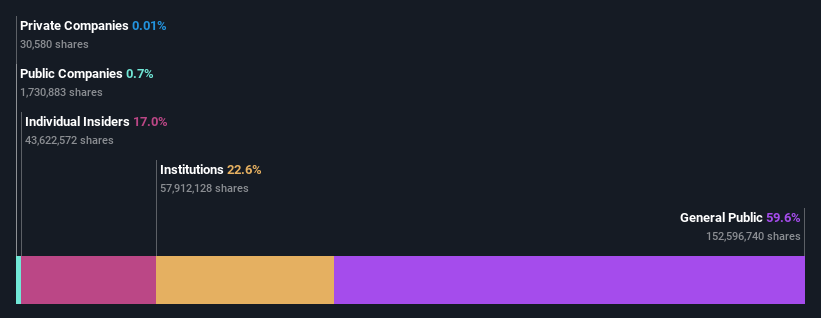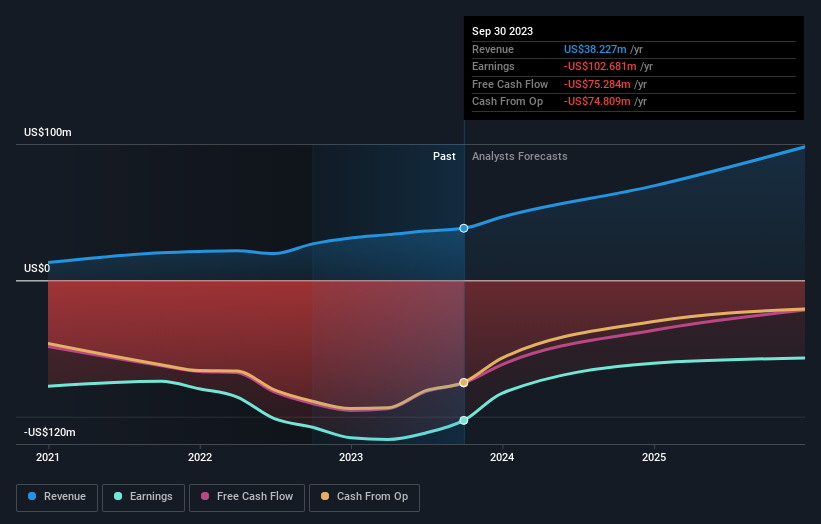While institutions invested in SoundHound AI, Inc. (NASDAQ:SOUN) benefited from last week's 69% gain, retail investors stood to gain the most
Key Insights
SoundHound AI's significant retail investors ownership suggests that the key decisions are influenced by shareholders from the larger public
A total of 25 investors have a majority stake in the company with 37% ownership
A look at the shareholders of SoundHound AI, Inc. (NASDAQ:SOUN) can tell us which group is most powerful. With 60% stake, retail investors possess the maximum shares in the company. In other words, the group stands to gain the most (or lose the most) from their investment into the company.
Following a 69% increase in the stock price last week, retail investors profited the most, but institutions who own 23% stock also stood to gain from the increase.
Let's delve deeper into each type of owner of SoundHound AI, beginning with the chart below.
View our latest analysis for SoundHound AI
What Does The Institutional Ownership Tell Us About SoundHound AI?
Institutional investors commonly compare their own returns to the returns of a commonly followed index. So they generally do consider buying larger companies that are included in the relevant benchmark index.
As you can see, institutional investors have a fair amount of stake in SoundHound AI. This can indicate that the company has a certain degree of credibility in the investment community. However, it is best to be wary of relying on the supposed validation that comes with institutional investors. They too, get it wrong sometimes. If multiple institutions change their view on a stock at the same time, you could see the share price drop fast. It's therefore worth looking at SoundHound AI's earnings history below. Of course, the future is what really matters.
We note that hedge funds don't have a meaningful investment in SoundHound AI. Because actions speak louder than words, we consider it a good sign when insiders own a significant stake in a company. In SoundHound AI's case, its Top Key Executive, Seyed Emami, is the largest shareholder, holding 7.2% of shares outstanding. Meanwhile, the second and third largest shareholders, hold 6.6% and 5.4%, of the shares outstanding, respectively. Interestingly, the second-largest shareholder, Keyvan Mohajer is also Chief Executive Officer, again, pointing towards strong insider ownership amongst the company's top shareholders.
A deeper look at our ownership data shows that the top 25 shareholders collectively hold less than half of the register, suggesting a large group of small holders where no single shareholder has a majority.
Researching institutional ownership is a good way to gauge and filter a stock's expected performance. The same can be achieved by studying analyst sentiments. There are a reasonable number of analysts covering the stock, so it might be useful to find out their aggregate view on the future.
Insider Ownership Of SoundHound AI
The definition of company insiders can be subjective and does vary between jurisdictions. Our data reflects individual insiders, capturing board members at the very least. Company management run the business, but the CEO will answer to the board, even if he or she is a member of it.
I generally consider insider ownership to be a good thing. However, on some occasions it makes it more difficult for other shareholders to hold the board accountable for decisions.
Our most recent data indicates that insiders own a reasonable proportion of SoundHound AI, Inc.. It has a market capitalization of just US$978m, and insiders have US$167m worth of shares in their own names. This may suggest that the founders still own a lot of shares. You can click here to see if they have been buying or selling.
General Public Ownership
The general public -- including retail investors -- own 60% of SoundHound AI. This size of ownership gives investors from the general public some collective power. They can and probably do influence decisions on executive compensation, dividend policies and proposed business acquisitions.
Next Steps:
It's always worth thinking about the different groups who own shares in a company. But to understand SoundHound AI better, we need to consider many other factors. To that end, you should learn about the 4 warning signs we've spotted with SoundHound AI (including 1 which makes us a bit uncomfortable) .
If you would prefer discover what analysts are predicting in terms of future growth, do not miss this free report on analyst forecasts.
NB: Figures in this article are calculated using data from the last twelve months, which refer to the 12-month period ending on the last date of the month the financial statement is dated. This may not be consistent with full year annual report figures.
Have feedback on this article? Concerned about the content? Get in touch with us directly. Alternatively, email editorial-team (at) simplywallst.com.
This article by Simply Wall St is general in nature. We provide commentary based on historical data and analyst forecasts only using an unbiased methodology and our articles are not intended to be financial advice. It does not constitute a recommendation to buy or sell any stock, and does not take account of your objectives, or your financial situation. We aim to bring you long-term focused analysis driven by fundamental data. Note that our analysis may not factor in the latest price-sensitive company announcements or qualitative material. Simply Wall St has no position in any stocks mentioned.

 Yahoo Finance
Yahoo Finance 

